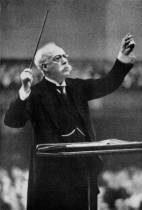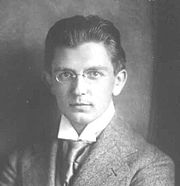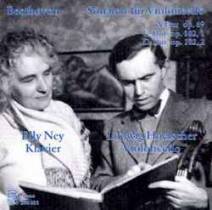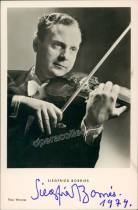
Max Fiedler (21 December 1859 – 1 December
1939) was a German conductor and composer, born August Max Fiedler in Zittau, Germany.
He first studied the piano with his father, who conducted the accompanying
orchestra when Max made his first public appearance at the age of ten in 1870,
playing Mozart’s Piano Concerto in A, K.488. Continuing his musical studies in
Zittau with the organist Gustav Albrecht, who had been a pupil of Mendelssohn,
Fiedler then entered the Leipzig Conservatory in 1877, where the director, Carl
Reinecke, was his piano teacher. He graduated in 1882, with exceptional
honours, alongside his friend and colleague Karl Muck. Fiedler also studied
composition and was active in the city’s musical life, developing a close
relationship with Julius Spengel, a friend of Brahms. Fiedler himself knew
Brahms sufficiently well for the composer to ask him to substitute for him in a
performance of his Piano Concerto No. 2 (as a young man Fiedler conducted Brahms'
Symphonies in the presence of the composer who, not given to reticence when
expressing himself, does not appear to have complained of Fiedler's
interpretations.), an invitation which Fiedler politely declined. He almost
certainly heard Brahms conduct the first Leipzig performances of his Symphony
No. 2 early in 1878 (though Ethel Smyth later wrote that Brahms "had the
knack of rubbing orchestras the wrong way... Moreover, the Gewandhaus musicians
were antagaonistic to his music" ) and his Violin Concerto on New Year's
Day, 1879, with the dedicatee, Joseph Joachim, as soloist, though Jan Swafford
writes that it "turned out a scrambling affair, with Joachim unnerved by
all the last-minute revisions and Brahms even more tense on the podium than
usual".
Having found work teaching at the Hamburg Conservatory Fiedler was soon
much in demand as a pianist, winning high praise for his ‘soft tone’. His first
appearance on the conductor’s podium came during the 1885–1886 season in a
performance of his own composition (a symphony), and his first complete concert
in late 1886. Encouraged to persevere by his first wife, who was from
Newcastle, he soon became one of the most popular conductors active in Hamburg,
alongside von Bülow, whose musicianship he admired and whose baton technique he
adopted. While it was not to be until 1903 that he took over the direction of
the Hamburg Conservatory, and 1904 that of the Hamburg Philharmonic Orchestra,
from 1898 onwards Fiedler was active abroad as a guest conductor, appearing in
Russia, where he was compared to Nikisch and Weingartner, Madrid (1899), Paris
(1901), Turin (1904), Rome (1906, 1908) and London (1907, 1908). Throughout
this period he developed a reputation as a major interpreter of the music of
Brahms, as well as a conductor with ‘complete mastery’ of the orchestra (The
Musical Times on his account of Tchaikovsky’s Symphony No. 6 ‘Pathétique’, with
the young London Symphony Orchestra in December 1907).
In 1908 Karl Muck, then the conductor of the Boston Symphony Orchestra,
recommended Fiedler as his successor as conductor of the orchestra, and he was
duly appointed, having already appeared in America during 1905, when he had
conducted the New York Philharmonic Orchestra alongside Mengelberg and a year
before the guest appearance of a German conductor noted for his Brahms, Fritz
Steinbach. Although he spent four years at the helm in Boston, his conducting
attracted some criticism, especially for his volatility as an interpreter,
which was viewed as pleasing ‘the general public’ rather than ‘connoisseurs’.
Fiedler returned to Hamburg in 1912, where Siegmund von Hausegger was now in
charge of the Philharmonic Orchestra; and since co-residence was likely to be
difficult, given his own status as a former conductor of this orchestra,
Fiedler withdrew to Berlin, where he became an active guest conductor of the
city’s various orchestras. In 1916 a Berlin critic hailed him as ‘the greatest
Brahms conductor of the present day’, and during the same year he accepted the
position of conductor of the Essen Orchestra, in succession to Hermann
Abendroth, who was moving to Cologne to replace Steinbach.
At Essen Fiedler consolidated his reputation as a major figure in
German musical life, conducting a wide repertoire that included contemporary
composers such as Braunfels, Szymanowski and Honegger, as well as each year
organising a festival devoted to a major single composer. In addition he
guest-conducted the Berlin Philharmonic occasionally, and from 1927 was
co-conductor of the Essen Folkwangschule. In 1929 he married for the second
time and in 1934 gave up his position in Essen, returning once more to Berlin
where he conducted the Berlin Radio Orchestra, as well as that of Hamburg.
During 1939 he made a series of farewell appearances in Berlin and Essen, but
towards the end of the year he became fatally ill, dying just a few weeks short
of his eightieth birthday.
Fiedler made several commercial recordings, all of music by Brahms,
apart from two overtures by Weber. He recorded the Academic Festival Overture,
Symphony No. 2, two movements from the Piano Concerto No. 2 and the Symphony
No. 4 with the Berlin Philharmonic Orchestra. In addition a number of his later
radio performances have been preserved: these include accounts of Brahms’s
Violin Concerto and Schumann’s Symphony No. 1 from Berlin. Because of his contemporary
stature as an interpreter of Brahms and his direct contact with the composer,
it is easy to consider Fiedler’s performances of Brahms as being in some way
‘authentic’. However the English writer Christopher Dyment has convincingly
argued that, while Fielder was a conductor who ‘…most fully explored every
facet of Brahms’s emotional world’, nevertheless his performances, because of
their constant shifts of tempo and mannered phrasing—for instance the frequent
introduction of unwritten luftpausen—reflected an interpretative model that
owed far more to von Bülow than to Brahms. Dyment concluded that in Fiedler’s
recording of the Symphony No. 4, for instance, ‘…Brahms’s demands for
flexibility are here supplied in over-abundance.’ Nonetheless, even if Fiedler’s
recordings do represent a highly individualised interpretative approach, they
still allow a fascinating glimpse into a world of musical performance only
imperfectly chronicled, for historical reasons, by the gramophone.

Об Альфреде Хёне см. тут

Элли Ней (нем. Elly Ney; 27 сентября 1882, Дюссельдорф – 31 марта
1968, Тутцинг) – немецкая пианистка. Училась в Кёльнской консерватории у
Изидора Зайсса и Франца Вюльнера, затем у Теодора Лешетицкого и Эмиля фон
Зауэра. В 1907 г. познакомилась, а в 1911 вышла замуж за скрипача Виллема ван
Хоогстратена (брак распался в 1927 г.), много концертировала в дуэте с ним. В
1920-е гг. жила и выступала преимущественно в США, упрочив мировую репутацию
выдающейся исполнительницы произведений Бетховена и Брамса. В 1930 г. вернулась
в Европу. В 1931 г. по инициативе Ней в Бонне был учреждён ежегодный фестиваль «Народные
бетховенские дни», проводившийся до 1944 г. и ставший предшественником
современного Бетховенского фестиваля.
Элли Ней поддержала установление в
Германии фашистского режима, в 1937 г. вступила в НСДАП, преподавала в
различных музыкальных учебных заведениях, в том числе в особой консерватории,
созданной немцами в оккупированном Кракове. Известно письмо Ней Йозефу
Геббельсу с вопросом, очищены ли уже Нидерланды от евреев: если да, то Ней
готова была согласиться на гастроли в этой стране. По окончании Второй мировой
войны на протяжении семи лет Элли Ней запрещено было выступать. В 1952 г. она была
прощена и вернулась к активной концертной деятельности, продолжавшейся до
последних лет её долгой жизни.
На фотографии Элли Ней стоит рядом с
немецким виолончелистом Людвигом Хёльшером.

Зигфрид Пауль Отто Боррис (нем. Siegfried
Paul Otto Borries; 10 марта
1912, Мюнстер – 12 августа 1980, Берлин) – немецкий скрипач и педагог. Учился в
Кёльнской консерватории у Брама Эльдеринга и Вильгельма Штросса. В 1933 г., в
возрасте 21 года, был приглашен Вильгельмом Фуртвенглером в Берлинский
филармонический оркестр в качестве 1-го концертмейстера. Покинув БФО, стал
зондерконцертмейстером Берлинской государственной капеллы, возглавляемой
Гербертом фон Караяном. Вскоре после окончания войны вернулся в БФО и работал
там 1-м концертмейстером до 1956 года. Преподавал в Высшей музыкальной школе и
Международном музыкальном институте в Берлине. Выступал с сольными концертами в
Германии и за ее пределами.
J. Brahms.
1. Piano Concerto No. 1 in D Minor, Op. 15:
1. Maestoso - Poco più moderato
2. Adagio
3. Rondo
Alfred Höhn, Piano
Grosses Berliner Funkorchester
Conductor: Max
Fiedler
Rec. 26 October
1936, Berlin
Формат: FLAC
2. Piano Concerto No. 2 in B Flat Major, Op. 83:
1.
Allegro non troppo (B-flat major)
2.
Allegro appassionato
3.
Andante
4. Allegretto grazioso
Elly Ney, Piano
Berlin Philharmonic Orchestra
Conductor: Max
Fiedler
Rec. 1939
Формат: FLAC 3. Akademische Fest-Ouverture, Op. 80:
Berlin Philharmonic Orchestra
Conductor: Max Fiedler
Rec. 1928
Формат: MP3
4. Symphony No. 2 in D Major, Op. 73:
1. Allegro non troppo
2. Adagio non troppo
3. Allegretto grazioso (quasi andantino)
4. Allegro con spirito
Berlin Philharmonic Orchestra
Conductor: Max Fiedler
Rec. 1928
Формат: MP3
5–6.
Symphony No. 4 in E Minor op. 98:
1. Allegro non troppo
2. Andante moderato
3. Allegro giocoso
4. Finale. Allegro energico e passionato
A. Berlin Philharmonic Orchestra
Conductor: Max Fiedler
Rec. 1929
Формат: MP3 B. The State Opera Orchestra, Berlin
Conductor: Max Fiedler
Rec. 1930
Формат: MP3 7. Concerto for Violin and Orchestra in D Major,
op. 77 (with the
Joachim Cadenza):
1. Allegro non troppo
2. Adagio
3. Allegro
giocoso, ma non troppo vivace – Poco più presto
Sigfried Borris, Violin
Berlin Radio Orchestra
Conductor: Max Fiedler
October 26, 1936 Live Broadcast, Berlin
Формат: APE
8. R. Schumann.
Symphony No. 1 in B Flat Major, Op.
38:
1. Andante un poco maestoso – Allegro molto
vivace
2. Larghetto
3. Scherzo & Trio I, II. Molto vivace
4.
Allegro animato e grazioso
Berlin Radio Orchestra
Conductor: Max Fiedler
December 11, 1936 Live Broadcast, Berlin
Формат: APE Партитуры всех входящих в релиз произведений к нему прилагаются.
Материалы, здесь представленные, взяты
отчасти из моей коллекции (4-я симфония «А»), отчасти из коллекции Павла (2-я
симфония и Академическая увертюра). За остальные материалы я благодарю
голландского блоггера Satyr (4-я симфония «B»), известного релизера Сергея Нестерова (logaber) (2-й концерт), французский сайт «Musique ouverte» (1-й концерт)
и сам не знаю кого (к сожалению, не помню, откуда получил диск со Скрипичным
концертом Брамса и 1-й симфонией Шумана, но благодарю искренне). | 
